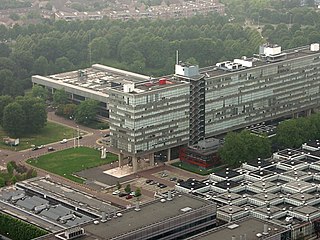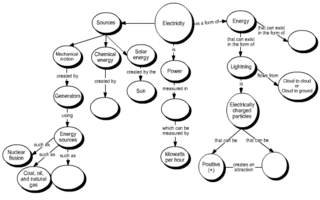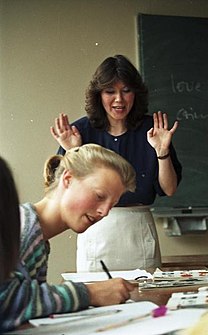Overview
Participants in a thesis circle meet regularly to discuss the progress of work on (mostly individual) final projects. Students are in charge of planning and chairing the sessions as well as managing and distributing information (e.g. draft chapters). The professor brings his/her disciplinary expertise and knowledge into the meetings of the thesis circle.

Information is the resolution of uncertainty; it is that which answers the question of "what an entity is" and is thus that which specifies the nature of that entity, as well as the essentiality of its properties. Information is associated with data and knowledge, as data is meaningful information and represents the values attributed to parameters, and knowledge signifies understanding of an abstract or concrete concept. The existence of information is uncoupled with an observer, which refers to that which accesses information to discern that which it specifies; information exists beyond an event horizon for example, and in the case of knowledge, the information itself requires a cognitive observer to be accessed.
Knowledge is a familiarity, awareness, or understanding of someone or something, such as facts, information, descriptions, or skills, which is acquired through experience or education by perceiving, discovering, or learning.
An important characteristic of thesis circles is the principle of switching roles: students participating in thesis circles frequently switch between their role as writer of a thesis (final project) and their role as co-supervisor of the other students in the circle (Romme, 1999). Research has demonstrated that role switching is a valuable source of learning between peers (McDougall & Beattie, 1997; Dochy, Segers & Sluijsmans, 1999). This mechanism serves to accelerate and deepen learning on key issues and challenges encountered in doing a final project (Romme & Nijhuis, 2000). In an educational sense, thesis circles are a particular form of collaborative learning, inspired by the sociocratic circular approach as well as Vygotsky's theory of the zone of proximal development. In terms of organizational theory, thesis circles are also inspired by the notion of the Learning Organization (e.g., Mazen, Jones & Sergenian, 2000).
Learning is the process of acquiring new, or modifying existing, knowledge, behaviors, skills, values, or preferences. The ability to learn is possessed by humans, animals, and some machines; there is also evidence for some kind of learning in some plants. Some learning is immediate, induced by a single event, but much skill and knowledge accumulates from repeated experiences. The changes induced by learning often last a lifetime, and it is hard to distinguish learned material that seems to be "lost" from that which cannot be retrieved.
Collaborative learning is a situation in which two or more people learn or attempt to learn something together. Unlike individual learning, people engaged in collaborative learning capitalize on one another's resources and skills. More specifically, collaborative learning is based on the model that knowledge can be created within a population where members actively interact by sharing experiences and take on asymmetric roles. Put differently, collaborative learning refers to methodologies and environments in which learners engage in a common task where each individual depends on and is accountable to each other. These include both face-to-face conversations and computer discussions. Methods for examining collaborative learning processes include conversation analysis and statistical discourse analysis.
Sociocracy, also known as dynamic governance, is a system of governance which seeks to achieve solutions that create harmonious social environments as well as productive organizations and businesses. It is distinguished by the use of consent rather than majority voting in decision-making, and decision-making after discussion by people who know each other.
Thesis circles appear to have a positive effect on both the quality of the supervision process and the performance of the students involved (Rompa & Romme, 2001; Romme, 2003). For example, a former participant in a thesis circle at Tilburg University observed that "the concept of a master thesis circle is an excellent idea to promote feedback among students and thus create a truly collaborative environment" (source).
Many thesis circles accomplish a culture of reflective (i.e. non-rhetorical) questioning and dialogue (Damen, 2007; Van Seggelen-Damen & Romme, 2014). The supervision style of the professor appears to have a strong impact on whether this culture of reflection comes about: in thesis circles with a coaching rather than instruction oriented supervisor, more reflective questioning and dialogue was observed (Van Seggelen-Damen & Romme, 2014). Furthermore, reflective questioning among participants in thesis circles enhances learning in terms of so-called multi-perspective cognitive outcomes (Suedfeld et al., 1992; Curşeu and Rus, 2005). Moreover, students with a stronger need for cognition (Cacioppo et al., 1996) and more openness to experience (McCrae & Costa Jr., 1997) engage more in reflection (Van Seggelen-Damen & Romme, 2014).

Culture is the social behavior and norms found in human societies. Culture is considered a central concept in anthropology, encompassing the range of phenomena that are transmitted through social learning in human societies. Cultural universals are found in all human societies; these include expressive forms like art, music, dance, ritual, religion, and technologies like tool usage, cooking, shelter, and clothing. The concept of material culture covers the physical expressions of culture, such as technology, architecture and art, whereas the immaterial aspects of culture such as principles of social organization, mythology, philosophy, literature, and science comprise the intangible cultural heritage of a society.

To ask questions about Wikipedia, see Wikipedia:Questions.
Dialogue is a written or spoken conversational exchange between two or more people, and a literary and theatrical form that depicts such an exchange. As a narrative, philosophical or didactic device, it is chiefly associated in the West with the Socratic dialogue as developed by Plato, but antecedents are also found in other traditions including Indian literature.
Thesis circles have been set up, for example, in Maastricht University, Tilburg University, University of Utrecht, Eindhoven University of Technology, Open University of the Netherlands, University of Twente, Rotterdam School of Management and Fontys University of Applied Sciences.

Tilburg University is a public research university specializing in the social and behavioral sciences, economics, law, business sciences, theology and humanities, located in Tilburg in the southern part of the Netherlands.

The Eindhoven University of Technology, abbr. TU/e, is a technical university in the Netherlands, operating in English.
The University of Twente is a public research university located in Enschede, Netherlands. It offers degrees in the fields of social sciences, exact sciences and is highly specialized in engineering.
Cognition is "the mental action or process of acquiring knowledge and understanding through thought, experience, and the senses". It encompasses many aspects of intellectual functions and processes such as attention, the formation of knowledge, memory and working memory, judgment and evaluation, reasoning and "computation", problem solving and decision making, comprehension and production of language. Cognitive processes use existing knowledge and generate new knowledge.
Instructional scaffolding is the support given during the learning process which is tailored to the needs of the student with the intention of helping the student achieve his/her learning goals This learning process is designed to promote a deeper level of learning.
In psychology, cognitivism is a theoretical framework for understanding the mind that gained credence in the 1950s. The movement was a response to behaviorism, which cognitivists said neglected to explain cognition. Cognitive psychology derived its name from the Latin cognoscere, referring to knowing and information, thus cognitive psychology is an information-processing psychology derived in part from earlier traditions of the investigation of thought and problem solving.
Social cognition is a sub-topic of various branches of psychology that focuses on how people process, store, and apply information about other people and social situations. It focuses on the role that cognitive processes play in social interactions.

A concept map or conceptual diagram is a diagram that depicts suggested relationships between concepts. It is a graphical tool that instructional designers, engineers, technical writers, and others use to organize and structure knowledge.
Situated cognition is a theory that posits that knowing is inseparable from doing by arguing that all knowledge is situated in activity bound to social, cultural and physical contexts.

David Kirsh is a Canadian cognitive scientist, and Professor at University of California, San Diego (UCSD), where he heads the Interactive Cognition Lab.
Learning sciences (LS) is an interdisciplinary field that works to further scientific, humanistic and critical theoretical understanding of learning as well as to engage in the design and implementation of learning innovations, and the improvement of instructional methodologies. Research in the learning sciences traditionally focuses on cognitive-psychological, social-psychological, cultural-psychological and critical theoretical foundations of human learning, as well as on the design of learning environments. Major contributing fields include cognitive science, computer science, educational psychology, anthropology, and applied linguistics. Over the past decade, researchers have also expanded their focus to the design of curricula, informal learning environments, instructional methods, and policy innovations.
Metacognition is "cognition about cognition", "thinking about thinking", "knowing about knowing", becoming "aware of one's awareness" and higher-order thinking skills. The term comes from the root word meta, meaning "beyond". Metacognition can take many forms; it includes knowledge about when and how to use particular strategies for learning or problem-solving. There are generally two components of metacognition: (1) knowledge about cognition and (2) regulation of cognition.
Cognitive apprenticeship is a theory that emphasizes the importance of the process in which a master of a skill teaches that skill to an apprentice.
Social neuroscience is an interdisciplinary field devoted to understanding how biological systems implement social processes and behavior, and to using biological concepts and methods to inform and refine theories of social processes and behavior. Humans are fundamentally a social species, rather than individualists. As such, Homo sapiens create emergent organizations beyond the individual—structures that range from dyads, families, and groups to cities, civilizations, and cultures. These emergent structures evolved hand in hand with neural and hormonal mechanisms to support them because the consequent social behaviors helped these organisms survive, reproduce, and care for offspring sufficiently long that they too survived to reproduce. The term "social neuroscience" can be traced to a publication entitled "Social Neuroscience Bulletin" that was published quarterly between 1988 and 1994. The term was subsequently popularized in an article by John Cacioppo and Gary Berntson, published in the American Psychologist in 1992. Cacioppo and Berntson are considered as the legitimate fathers of social neuroscience. Still a young field, social neuroscience is closely related to affective neuroscience and cognitive neuroscience, focusing on how the brain mediates social interactions. The biological underpinnings of social cognition are investigated in social cognitive neuroscience
A learning community is a group of people who share common academic goals and attitudes, who meet semi-regularly to collaborate on classwork. Such communities have become the template for a cohort-based, interdisciplinary approach to higher education. This may be based on an advanced kind of educational or 'pedagogical' design.

Stanislas Dehaene is a French author and cognitive neuroscientist whose research centers on a number of topics, including numerical cognition, the neural basis of reading and the neural correlates of consciousness. As of 2017, he is a professor at the Collège de France and, since 1989, the director of INSERM Unit 562, "Cognitive Neuroimaging".

The need for cognition (NFC), in psychology, is a personality variable reflecting the extent to which individuals are inclined towards effortful cognitive activities.

Socratic questioning was named after Socrates, who was a philosopher in c. 470 BCE–c. 399 BCE. Socrates utilized an educational method that focused on discovering answers by asking questions from his students. Socrates believed that "the disciplined practice of thoughtful questioning enables the scholar/student to examine ideas and be able to determine the validity of those ideas". Plato, a student of Socrates, described this rigorous method of teaching to explain that the teacher assumes an ignorant mindset in order to compel the student to assume the highest level of knowledge. Thus, a student has the ability to acknowledge contradictions, recreate inaccurate or unfinished ideas and critically determine necessary thought.

John Terrence Cacioppo was the Tiffany and Margaret Blake Distinguished Service Professor at the University of Chicago. He founded the University of Chicago Center for Cognitive and Social Neuroscience and the Director of the Arete Initiative of the Office of the Vice President for Research and National Laboratories at the University of Chicago. He co-founded the field of social neuroscience and was member of the Department of Psychology, Department of Psychiatry and Behavioral Neuroscience, and the College until his death in March 2018.
Gary Berntson is professor at Ohio State University with appointments in the departments of psychology, psychiatry and pediatrics. He is an expert in psychophysiology, neuroscience, biological psychology, and with his colleague John Cacioppo, a founding father of social neuroscience.
His research attempts to elucidate the functional organization of brain mechanisms underlying behavioral and affective processes, with a special emphasis on social cognition.
A. Georges L. (Sjoerd) Romme is a Dutch organizational theorist and professor of entrepreneurship and innovation at the Eindhoven University of Technology.
Anne-Françoise Rutkowski is a French psychologist and Professor Management of Information: Impact on Organization, Business and Society at the Tilburg University School of Economics and Management. known for her work on virtual collaboration.
Wilhelmus Gijsbertus Henri (Wim) van Hulst (1939-2018) was a Dutch business economist, and Emeritus Professor Business Economics at the Tilburg University.












